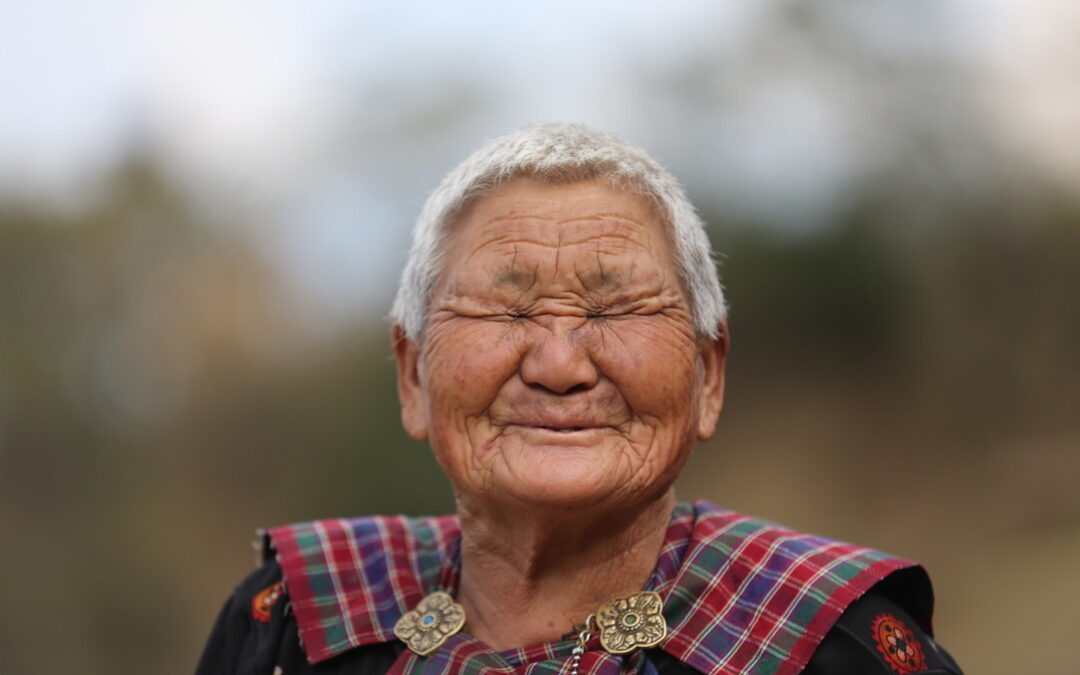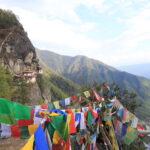The fresh breeze of mountain air, clear streams glittering under the golden rays of sunshine, trees and more trees, and the intermittent knell of a prayer wheel spinning with the attached blessings; to me, this is the essence of Bhutan. I remain grateful for the opportunity to have volunteered at the Psychiatric Unit in Thimphu for four months. This allowed me to be of service and to spend time getting familiar with the culture and heritage of this beautiful country.
Having worked in mental health for over thirty-five years, I was fascinated with Gross National Happiness. I did my due diligence to discover it was not just a transitory individual pursuit of making myself happy but was rooted in Wellness and all the areas required to truly find peace and contentment in our lives or Happiness.
• Psychological wellbeing
• Health
• Education
• Time use
• Cultural diversity and resilience
• Good governance
• Community vitality
• Ecological diversity and resilience
• Living standards
I was fascinated with these nine domains. There is an understanding of man’s basic needs while deeply rooted in compassion. Upon moving to Bhutan for a four-month volunteer position, I became better educated on GNH. I discovered this concept’s alignment with the kind of therapy I had been doing all my work life. We cannot live or heal all the facets of ourselves without attending to and having knowledge of all those parts of ourselves that feed each other. During my tenure, Dr. Dorji Chenco, the head of Psychiatry, exuded this same intelligence and compassion when working with patients. He was encouraging when I mentioned that I might do a Women’s Heritage Walk in Bhutan, and he remains involved today.
In the last six months, I have been working with Uygen Wangchuk, a trekking guide I walked with and a trusted collaborator. Last month I returned to Bhutan to solidify plans with Uygen. Together we created a team, finalized the daily schedule, and looked around for Bhutanese ladies interested in walking with twenty international ladies. Our excitement heightened, and we are working hard to deliver a meaningful program.
As a psychotherapist and a curious person, the Women’s Heritage Walk has been a growth process for me. The back story is that while in my first position as a new therapist, I was working with a young woman who had been brutally raped and had started drinking heavily to numb herself. She was at threat of losing her job. I could not connect in a way that helped her feel safe enough to do the hard work of healing. I noticed she kept looking out of the window. I knew she was raised in the mountains and asked her if she would like to go for a walk. She jumped out of her seat and headed for the door. Once we were out in nature and walking side by side, she began talking. It was a teaching moment for me, and I thank her for showing me that therapy, growth, and healing come in many forms and places.
After that, I started a ‘Walk and Talk” initiative individually and in groups. I also discovered that women walking together was therapeutic in and of itself. When women gather to learn and discuss significant issues (marriage, parenting, health, aging, spirituality …..), they learn to grow and normalize each other’s lives. When they become better educated, feel stronger and more capable, and have support from other women, their quality of life, marriage, and the lives of their families improve.
Creating a more systematic Women’s Wellness program in 1993 was the next obvious progression. I introduced it to communities in Germany, Poland, and Italy, then expanded it to schools. The program was and remains today based on the belief that we all have challenges and sorrows but can heal and grow when we are educated and guided. During the next twenty years, and as my knowledge base grew, I added classic meditation, walking meditation, creativity, and more arduous walks to the repertoire as I grew to understand how increasingly necessary it was for people to unplug and quiet their minds to discover the answers to life’s challenges that only they can find.
Also, during this time, my husband and I lived, worked, and raised our three children in five countries. Our heightened awareness of the need for cultural intelligence and empathic acceptance of heritage and cultures. In this process, I found reinforcement for my belief that women, especially mothers, are the same in their fondest wishes: to love and be loved, feel safe and respected, share community, and have basic needs met for our families and ourselves.
By 2015, these programs grew into the Women’s Heritage Walk, Abu Dhabi, and were firmly established in the four pillars of Health and Wellness, Culture and Heritage, Strength and Leadership, and Community Support. WHW is designed to create an atmosphere of acceptance and empathy of self and others and employ self-examination to clarify values and goals and find contentment.
The foundation of this program is the same in every country but tailored to its uniqueness. In Bhutan, we will focus more on the GNH. It has much to offer the Bhutanese and the International community. We will learn more about spirituality through Buddhism teachings and from local Lamas. Textiles are beautifully unique in Bhutan and have been a skill predominantly of women over the centuries. Dance, archery, agriculture, respect for the environment, and the lure of the mountains will play a central role. Primarily we will spend time gazing at Jomolhari, getting to know each other, laughing, encouraging our partners to keep walking when it becomes difficult, talking about husbands, lovers, friends, and family, and finding a peaceful path forward.
Please join us. I look forward to meeting you. The twelve-week Wellness and physical training begins on 8 July with our first Zoom call and introductions worldwide. Please get in touch with Ugyen or me at u.wangchu@gmail.com or info@womensheritagewalk.com.
All photos courtesy of Ugyen Wangchuk




Recent Comments